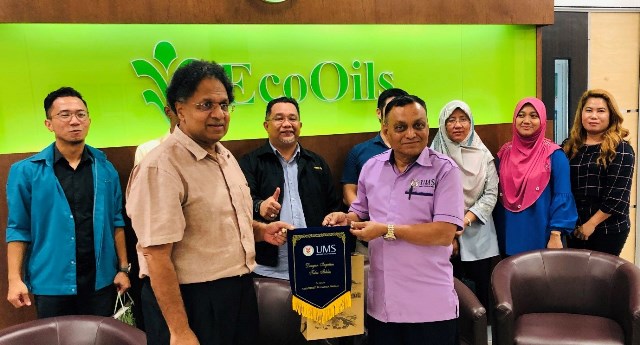 MONDAY, 24 JANUARY - Increasing the industry cooperation through network discussions and visits headed by dean faculty, Prof. Ir. Dr Abdul Karim Mirasa and few lecturers to Factory EcoOils Lahad Datu Sdn Bhd recently is one of the active approaches by the Faculty to synergised and strengthen industry relationship.
MONDAY, 24 JANUARY - Increasing the industry cooperation through network discussions and visits headed by dean faculty, Prof. Ir. Dr Abdul Karim Mirasa and few lecturers to Factory EcoOils Lahad Datu Sdn Bhd recently is one of the active approaches by the Faculty to synergised and strengthen industry relationship.
The meeting also presented an opportunity for EcoOils to present the detailed production process and the differentiation elements from other similar competitors.
UMS representatives were able to understand in depth the additional steps involved in production, which uses EcoMineral (final product after oil extraction from Spent Bleaching Earth) in a self-sustaining power generation system using steam to operate the plant.
Furthermore, the plant tour enabled UMS to visualize the investments and the measures taken by EcoOils to be truly Eco-friendly without disposed their spent bleaching earth after oil extractions to landfills.
Even though steam boiler produce end product or ash residue named as EcoProcessed Pozzolan (EPP), it is however have positive prospect application in mix concrete and brick manufacturing.
Prompted discussions on other avenues for R&D with UMS such in potential uses in asphalts, tiles, building materials, glass manufacturing with some of the possible innovations includes, silicon wafer and ceramic water filter.
Meanwhile, both UMS and EcoOils also benefited from the discussions toward the advantages to students from the teaching factory which produces the interlocking bricks.
EcoOils’s EPP has allowed them to explore another avenue to potentially reduce cost and produce cheaper and more functional products for the market.
The presentation of the completed projects by UMS using EPP enabled EcoOils representatives to envisage the use of the IBS in actual construction and the potential as an alternative building solution. Hence, produce sustainable construction material in line with concept 'waste to wealth'.
In a nutshell, the collaboration visit by UMS to Lahad Datu EcoOils SDN BHD was fruitful to both parties and provides a platform for a closer relationship and improved knowledge transfer.
The objective to reach better understanding and outline the collaborations for future efforts were truly achieved during this visit.



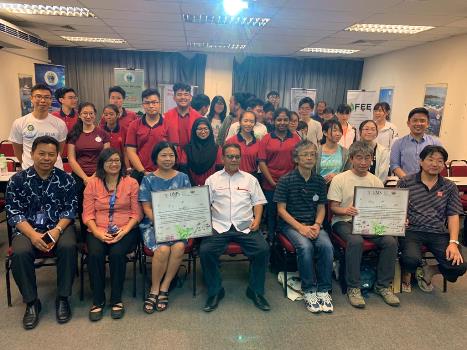 How much are we polluting the ocean with plastics? What kinds of plastics are we polluting our ocean with? Are we collaborating enough to work out a global solution to plastic pollution? In order to address these questions, an environmental education and public awareness programme, the first for the year, was successfully carried out on January 10th, 2019 (Thursday) between UMS (via the EcoCampus Management Centre) and Hokkaido Sapporo Keisei High School (a designated Super Science High School) at UMS.
How much are we polluting the ocean with plastics? What kinds of plastics are we polluting our ocean with? Are we collaborating enough to work out a global solution to plastic pollution? In order to address these questions, an environmental education and public awareness programme, the first for the year, was successfully carried out on January 10th, 2019 (Thursday) between UMS (via the EcoCampus Management Centre) and Hokkaido Sapporo Keisei High School (a designated Super Science High School) at UMS. 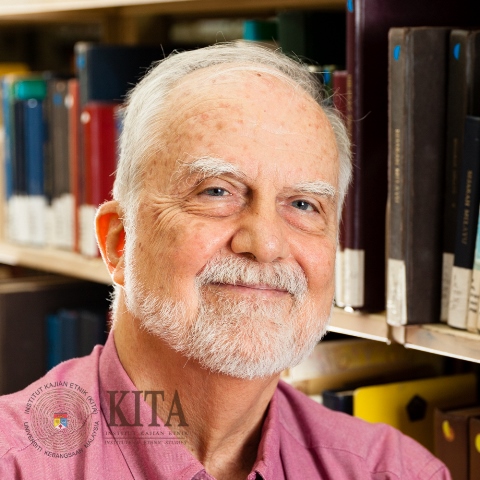 MONDAY, 31 DECEMBER - According to the Ethnologue, 7,097 languages are spoken in the world today, but that number is always in flux depending on the survival of each language as “roughly a third of the languages are endangered”. 2018 has been a great year for languages and linguistics for RULLS specifically and for UMS in general. Since starting its operation on 1 Feb 2018, RULLS has worked to spread the message that UMS is on point to state that this university is relevant and a reference in the niche areas of languages and linguistic. Hence, it was apt that RULLS conducted its first workshop on the eve of the 2nd International Conference on Languages, Linguistics, and Society on 7 Nov 2018 with the title ‘Language Revitalization and Documentation’. The 1-day workshop was led by renowned linguist, Emeritus Professor Dr. James T. Collins, from the Institute of Ethnic Studies (KITA), Universiti Kebangsaan Malaysia.
MONDAY, 31 DECEMBER - According to the Ethnologue, 7,097 languages are spoken in the world today, but that number is always in flux depending on the survival of each language as “roughly a third of the languages are endangered”. 2018 has been a great year for languages and linguistics for RULLS specifically and for UMS in general. Since starting its operation on 1 Feb 2018, RULLS has worked to spread the message that UMS is on point to state that this university is relevant and a reference in the niche areas of languages and linguistic. Hence, it was apt that RULLS conducted its first workshop on the eve of the 2nd International Conference on Languages, Linguistics, and Society on 7 Nov 2018 with the title ‘Language Revitalization and Documentation’. The 1-day workshop was led by renowned linguist, Emeritus Professor Dr. James T. Collins, from the Institute of Ethnic Studies (KITA), Universiti Kebangsaan Malaysia.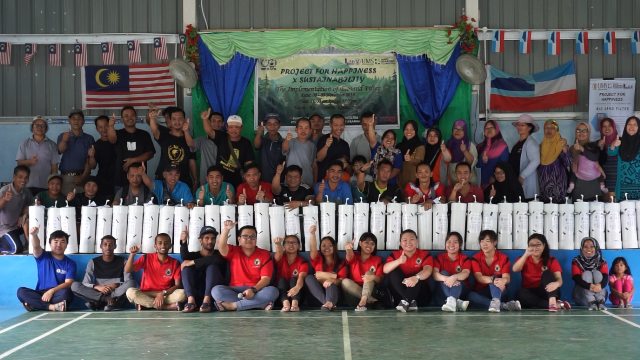 FRIDAY, 21 DECEMBER - A group of 12 civil engineering final year students of Faculty of Engineering, University Malaysia Sabah (UMS) have been engaged with the community of Kg. Singgaron Baru, Ranau for water security and quality improvement using Biosand Water Filter recently.
FRIDAY, 21 DECEMBER - A group of 12 civil engineering final year students of Faculty of Engineering, University Malaysia Sabah (UMS) have been engaged with the community of Kg. Singgaron Baru, Ranau for water security and quality improvement using Biosand Water Filter recently.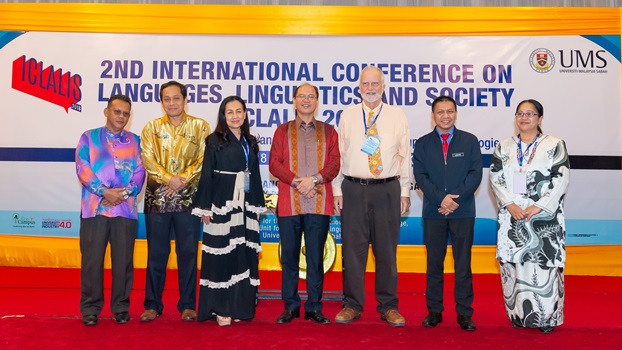 WEDNESDAY, 05 DECEMBER - In its first role as conference organizer, the Research Unit for Languages & Linguistics of Sabah (RULLS) successfully held the 2nd International Conference on Languages, Linguistics, and Society (ICLALIS 2018) with the Centre for the Promotion of Knowledge and Language Learning (PPIB) Universiti Malaysia Sabah (UMS) at the Promenade Hotel, Kota Kinabalu, recently.
WEDNESDAY, 05 DECEMBER - In its first role as conference organizer, the Research Unit for Languages & Linguistics of Sabah (RULLS) successfully held the 2nd International Conference on Languages, Linguistics, and Society (ICLALIS 2018) with the Centre for the Promotion of Knowledge and Language Learning (PPIB) Universiti Malaysia Sabah (UMS) at the Promenade Hotel, Kota Kinabalu, recently.